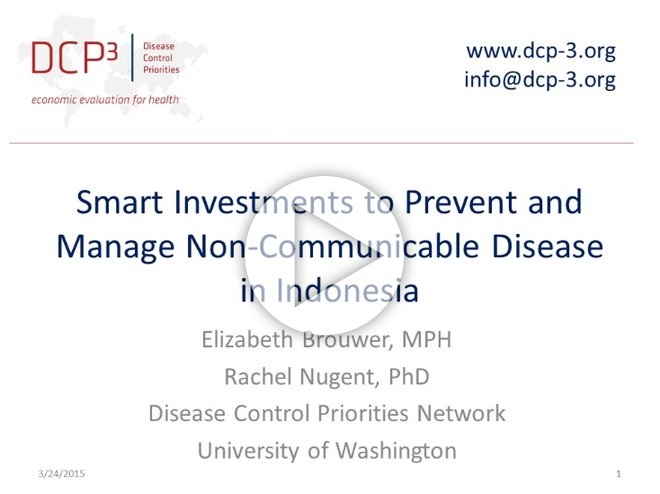Indonesia Perspectives: Non-communicable Diseases
Seminar Speakers:
- Rachel Nugent, Clinical Associate Professor in the Department of Global Health, University of Washington
Seminar Presentation by Rachel Nugent:
Background
Although the fight against infectious diseases has benefitted so many people, Indonesia is suffering more and more from what were once seen as the diseases of affluent countries, such as heart disease and cancer. These so-called non-communicable diseases (NCDs) now account for over 65% of all deaths in the country.
Smoking and obesity are two major risk factors for a whole range of NCDs, including hypertension, heart disease, cancer and diabetes. Obesity is a difficult thing to prevent in a population, but in high-income countries there has been some real success in cutting deaths by reducing tobacco consumption and encouraging healthier diets. The Copenhagen Consensus study suggests there is every reason to think that similar success can be achieved in Indonesia.
Increasing the price of cigarettes through taxation is a very effective way to reduce consumption. Currently, Indonesia has one of the highest levels of cigarette use and the highest percentage of young smokers in the world. In 2010, 41% of boys aged 13-15 smoked and more than 65% of adult men smoked regularly. Tobacco consumption is believed to cause between 13 and 15% of all deaths and over 20% of male deaths in the country. Over half a million Indonesians will die each year from causes attributable to smoking by 2030 if current trends continue.
This is partly because cigarette prices are low (an average pack of cigarettes from a kiosk costs 12,700 IDR) compared with other low-income countries, and taxation is low and quite easily avoided. The great majority of smokers use domestically-produced kreteks, which are largely untaxed. Increasing taxes acts as a disincentive to smoke, particularly for young people. The Copenhagen Consensus study recommends increasing tax to 15% of the current sale price over the next 15 years to reduce cigarette consumption by 60%.
About half of the currently projected 534,000 tobacco-related deaths in 2030 would be premature, that is those dying would be younger than the age of 70, the current average life expectancy in the country. The rise in taxation would mean that 60 million people would quit smoking, cut back their consumption heavily, or never start smoking in the first place; this would save 107,000 premature deaths each year.
As well as the human misery avoided, each survivor would on average work for another 15 years, benefitting both his family and the overall economy (giving overall productivity gains of 21 trillion IDR). There would be costs to implement the policy, of course, but the health and productivity gains would be worth up to 11,000 rupiah for every thousand spent, not counting the additional tax income.
Stroke is the top cause of death in the country, with heart disease at number five. Smoking, high blood pressure and poor diet are the main causes of both. Obesity occurs in parallel with childhood under-nutrition, giving a double burden of malnutrition, but unfortunately there are no easy ways to ensure people eat a healthy, balanced diet. However, 30% of the population aged 30 to 70 has a medium to high risk of dying from conditions brought on by high blood pressure, and there are effective ways to improve their health.
Successfully treating just a quarter of these would pay back 13,000 IDR for every thousand rupiahs spent on treatment. This assumes that half the 60 million Indonesians needing medication receive it and that half of these people complete their treatment. By 2030, this could save over 66,000 premature deaths and greatly improve the lives of many more.
High blood pressure can also be controlled by reducing salt in the diet, and public policy has been effective at doing this in many countries, including China. Using salt substitutes, educating consumers and reducing salt levels in processed foods are all things which should be considered in Indonesia.
Indonesia has a major, ongoing NCD problem, which needs policies such as these to turn the tide.


